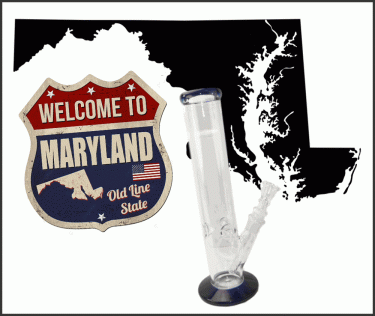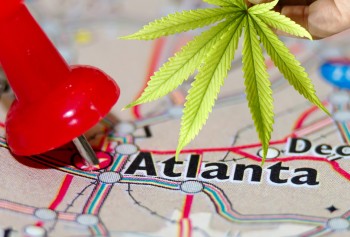
Maryland is making significant progress in cannabis reform and preparation for implementing adult-use marijuana legalisation. As the state gears up for the forthcoming changes, a bill preventing police from using the odor or possession of cannabis alone as the basis for a search has been allowed to become law by the governor. This move marks a crucial step in protecting individuals' rights and addressing concerns regarding unwarranted searches solely based on the presence of cannabis. Along with this development, Maryland has enacted several additional cannabis reform measures, including the protection of parents and guardians who use marijuana and the implementation of marijuana sales laws. These measures illustrate the state's commitment to establishing a fair and equitable system that reflects changing opinions toward marijuana nationwide.
Restricting Police Searches Based on Cannabis Odor and Possession and Limiting Vehicle Searches
Maryland has taken significant strides in curbing unwarranted police searches related to cannabis. The newly enacted law in the state prohibits law enforcement officials from initiating stops or searches based solely on the smell of burnt or unburnt cannabis, possession of a personal use amount of marijuana, or the presence of money near marijuana. These changes aim to protect individuals from unnecessary intrusions and ensure that law enforcement actions are based on solid evidence of intent to distribute.
Additionally, the legalization imposes restrictions on searching motor vehicles during investigations into suspected impaired driving. Notably, law enforcement agents are not permitted to examine parts of the vehicle that the driver cannot access or locations that are not reasonably anticipated to yield evidence relevant to the driver's or operator's condition. Maryland attempts to guarantee that searches are undertaken only when there is probable suspicion and the search area is reasonably likely to yield evidence connected to the inquiry by enacting certain constraints.
These reforms align with the evolving understanding that cannabis odour or possession should not be sufficient grounds for law enforcement to conduct searches. By setting clear guidelines, Maryland aims to protect individual's privacy rights and ensure that police actions are based on more substantial evidence of criminal activity. Such changes reflect the state's commitment to addressing the disproportionate impact of cannabis-related enforcement on marginalised communities and fostering a fair and equitable approach to cannabis regulation.
Changes in Penalties and Evidence Admissibility:
In addition to limiting police searches and protecting individuals' rights, the newly enacted legislation in Maryland brings about significant changes in penalties and the admissibility of evidence related to cannabis offences. One notable change is the reduction of the fine for public cannabis consumption from $250 to $50. This adjustment aims to make the penalty less severe for individuals who choose to consume marijuana in public.
Furthermore, the law clarifies that evidence obtained violating the newly established guidelines, including evidence collected with consent, will not be admissible in court. This provision strengthens the protection of individuals' rights and ensures that evidence obtained unlawfully, solely based on the odour or possession of cannabis, cannot be used against them. By implementing these changes, Maryland demonstrates its commitment to upholding fairness and safeguarding the integrity of legal proceedings within the context of cannabis-related offences.
These penalties and evidence admissibility updates serve as essential safeguards, promoting a more just and equitable legal system surrounding cannabis use and possession. Maryland continues to align its laws with evolving public attitudes towards marijuana, prioritising the protection of individual rights and working towards a more balanced and compassionate approach to cannabis regulation.
Protection of Parents and Guardians Who Use Marijuana:
Recognising the importance of ensuring that responsible marijuana use by parents and guardians does not lead to unwarranted child neglect allegations, Maryland has enacted a bill that offers protection in this regard. The legislation specifies that state officials will not construe the lawful and responsible use of marijuana by parents or guardians as child neglect.
This provision acknowledges that the responsible consumption of marijuana by parents or guardians should not automatically trigger intervention by child welfare agencies as long as it does not impair their ability to fulfil their parental duties. By offering this protection, Maryland aims to create a more understanding and supportive environment for families where marijuana use is a part of their lifestyle without subjecting them to unnecessary scrutiny or potential disruption.
Including this provision reflects Maryland's commitment to recognizing the rights and choices of parents and guardians while promoting a balanced approach to child welfare. It acknowledges that responsible marijuana use, like responsible alcohol consumption, should not automatically lead to allegations of neglect. It underscores the importance of considering the specific circumstances and impact on a child's well-being before taking intervention measures.
Advancing Towards Statewide Marijuana Legalization
Maryland is on the verge of legalizing marijuana statewide, as politicians work tirelessly to enact comprehensive cannabis regulation legislation. The upcoming amendments, expected to go into effect in July, will allow people in the state to buy and possess up to 1.5 ounces of cannabis. Furthermore, criminal sanctions for possessing up to 2.5 ounces of cannabis will be eliminated, indicating a more permissive attitude to cannabis infractions. This huge shift not only corresponds to evolving public attitudes toward marijuana but also allows individuals to exercise greater personal choice and autonomy in their cannabis intake.
The forthcoming legislation in Maryland also addresses the issue of past convictions related to marijuana offences. It establishes an automatic expungement process for activities now legalised under the proposed law. This provision aims to rectify the injustices and disproportionate impact of the war on drugs by clearing the records of individuals with prior marijuana-related convictions. Additionally, those currently serving sentences for such offences will have the opportunity for resentencing, promoting fairness and justice within the criminal justice system.
Maryland's progress towards statewide marijuana legalization signifies a significant step towards a more equitable and just cannabis policy. By enacting comprehensive regulations and expungement measures, the state aims to create a framework that acknowledges responsible cannabis use and gives individuals the freedom to make informed decisions without the burden of past convictions. This forward-thinking approach reflects Maryland's commitment to addressing the failures of the war on drugs and promoting a fair and inclusive society where the benefits and risks of cannabis are managed responsibly.
Bottom Line
Maryland's forthcoming statewide marijuana legalisation reflects the state's commitment to progressive cannabis reform and addressing the failures of outdated drug policies. The legislation, which allows adults to purchase and possess cannabis while implementing comprehensive regulations and expungement measures, signifies a significant shift towards personal freedom, social equity, and a more just society. By acknowledging responsible marijuana use, limiting unwarranted searches, protecting parents and guardians, and rectifying past convictions, Maryland sets an example for other states seeking a fair and responsible approach to cannabis regulation. Through these reforms, the state strives to establish a balanced framework that respects individual rights, promotes social equity, and effectively manages marijuana-related activities.
MORE ON MARYLAND CANNABIS, READ ON...
MARYLAND LEGALIZES RECREATIONAL CANNABIS, READ HOW THEY DID IT!







